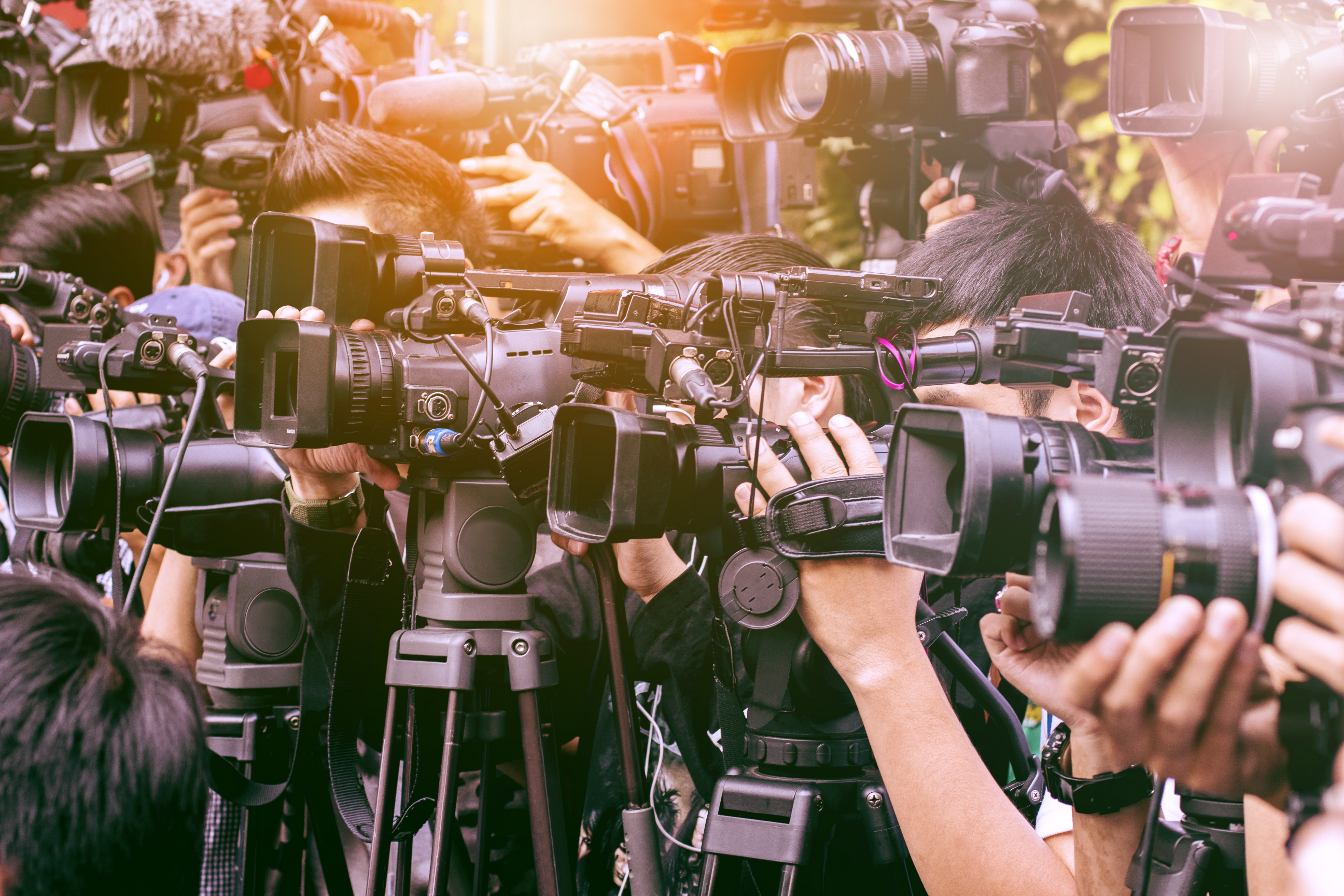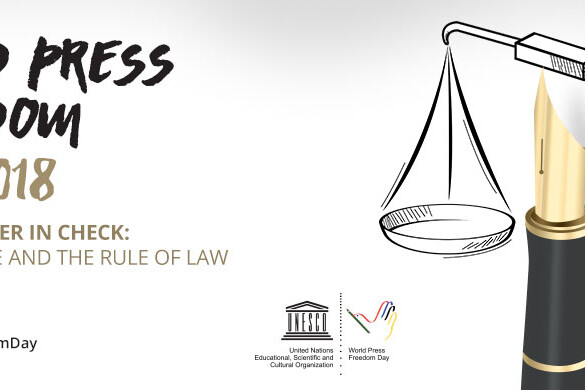Our weekly round-up of public service media related stories and headlines from around the world.
Click on the drop-down menus below to reveal the latest regional stories.
BENIN: Popular opposition newspaper closed for insulting Benin’s president
RSF: La Nouvelle Tribune is finished. On to the next one,” a cartoon on the newspaper’s front page said yesterday, a day after the HAAC issued its decision to close it until further notice for “conducting during recent months an insulting and offensive campaign violating the Head of State’s privacy and using a degrading vocabulary.”
BURKINA FASO, GHANA & SENEGAL: Funding Opportunity for Investigative Reporting
MFWA: As part of efforts to enhance transparency and accountability in West Africa, the Media Foundation for West Africa (MFWA) is offering funding opportunity to journalists in Ghana, Senegal and Burkina Faso to support investigative reporting.
BURUNDI: Govt Signals Readiness to Lift Ban on VOA, BBC Broadcasts
VOA via All Africa: Burundi said it is ready to lift a six-month ban on VOA and BBC broadcasts, but after it meets with delegations from the two global media outlets.
LESOTHO: Lesotho Constitutional Court declares criminal defamation unconstitutional
CPJ: The Committee to Protect Journalists today welcomed yesterday’s ruling by Lesotho’s Constitutional Court that criminal defamation is unconstitutional, calling it a significant step toward safeguarding press freedom in the country.
MALAWI: MBC grappling with huge debts, tax arrears: Begs Malawi Parliament for additional funds
Nyasa Times
NIGERIA: We’ll not condone irresponsible 2019 political broadcasting
Vanguard: The National Broadcasting Commission, NBC, has warned that it will not entertain what it described as irresponsible political broadcasting as the 2019 general elections approaches.
SIERRA LEONE: How Sierra Leone polices social media
Mail & Guardian: With the world’s highest internet growth rates, the African continent is experiencing a surge in social media use. However, along with this growth has come numerous government attempts to limit, monitor, tax, or block access to social media sites.
SUDAN: Network Concerned About Press Crackdowns in Sudan
Via All Africa: The Cairo-based Arab Network for Crisis Information has expressed its “deep concern” about the “systematic violations and the vicious attacks” by the Sudanese authorities on the press in the country.
SWAZILAND: Censorship Total At Swazi State Media
Via All Africa: The extent to which state media in Swaziland is censored to control people’s understanding of what is going on in the kingdom, has been revealed by UNESCO.
TANZANIA: Tanzania’s latest clampdown takes decades of repression to new lows
The Conversation
TUNISIA: Tunisian journalists say police union attacks are having a chilling effect on press freedom
Global Voices: In Tunisia, police are obligated to protect journalists not only because they are citizens, but also because attacks against journalists are a crime punishable by jail time. But when coverage has questioned the conduct of security institutions, law enforcement officials and their powerful unions have too often ignored duty and issued direct threats against media workers — both online and off.
ZIMBABWE: Oppressive media laws dampen hopes of change in Zimbabwe
IPI: Six months after Mugabe’s ouster, key reforms remain unfulfilled.
GENERAL: The Africa Challenge
EJN: African journalists and media are targeting political corruption as a significant obstacle to democracy and economic growth across the continent.
BANGLADESH: AIR, Betar to co-produce radio programmes
The Tribune: All India Radio (AIR) and state-run Bangladesh Betar will co-produce radio programme on music, quiz, theatre, tourism and sports among others, a move aimed at further strengthening bilateral ties, a senior official said.
HONG KONG: Hong Kong’s FactWire Startup Takes Novel Approach: No Editors
GIJN: The result is a back-to-basics news service that focuses on investigations, no-frills writing and reporting, and one that prioritizes serving people via its wire clients rather than creating beautifully designed content, chasing viral stories or obsessing over traffic goals.
INDIA: How women have to fight to be journalists in India
Via IFEX
INDIA: The story barely reported by Indian media
BBC News: It is a potential scandal that claims to strike at a key pillar of Indian democracy – the freedom of the press – yet it is barely being reported in the Indian media.
JAPAN: This Media Startup Is Beating the Competition With a Newsroom Run by Robots
Bloomberg
KAZAKHSTAN: Government concerns for media ring hollow
Eurassianet: While officials worry about the state of the press, activists say the government is the main enemy of media freedom.
MALAYSIA: Malaysia’s media still hesitant to speak truth to power despite change of govt
The Japan News
MALAYSIA: Press freedom opens up in Malaysia
RFI: Journalists who exposed Malaysian corruption and paid the price have begun reporting freely since the 9 May election that toppled prime minister Najib Razak.
MALDIVES: Social media a ‘threat to national security’
Maldives Independent: “Irreligious” discourse on social media and the politicisation of religious extremism is a threat to national security, the defence minister has said.
MYANMAR: ‘We have propaganda in our brain’: A conversation on press freedom in Burma
Asian Correspondent: Mention “Myanmar government” to Yin Yadanar Thein, the co-founder of Free Expression Myanmar, and she asks back: “Which government? The NLD, or the military?”
NORTH KOREA: Eight South Korean journalists denied entry into North Korea
CPJ: While a group of foreign journalists today arrived in North Korea to cover the dismantling, eight South Korean journalists were denied visas into North Korea at the last minute after tensions between Pyongyang and Seoul escalated over a South Korean military exercise with the United States, according to news reports.
PAKISTAN: Council of Pakistan Newspaper Editors voices concern at curbs on media freedom
Dawn
PAKISTAN: The Plight of Pakistan’s Journalists
The Diplomat: The free press is being suffocated in Pakistan.
PHILIPPINES: Philippine news site Rappler recognized as 2018 Free Media Pioneer
IPI: Founder says award ‘bolsters our courage and reinforces our hope’.
SOUTHEAST ASIA: Press freedom in Southeast Asia (Listen)
ABC Radio National: Earlier this month, The Phnom Penh Post, an English-language newspaper widely seen as the last bastion of free press in Cambodia, was sold to a Malaysian investor with ties to the Cambodian government.
SRI LANKA: Evolving Media ‘Freedom’: The Case for an Indomitable Rights Culture in Sri Lanka (Press Release)
News 1st: Whilst a balanced and vibrant media is a cornerstone of democracy and the freedom of expression recognised as a universal human right, it is also incumbent upon the journalist to disseminate accurate, timely and responsible information through reportage to the general public.
TAIWAN: World Health Organization blocks Taiwanese outlets from attending annual assembly
CPJ: Taiwan was not invited to the assembly this year, and no Taiwanese media outlets were granted press accreditation, according to news reports.
THAILAND: Thai media freedom takes beating under junta
The Star: Although there are no longer military personnel posted at media outlets here, unlike during the period following a military coup on May 22, 2014, a tight grip on the media has been maintained more surreptitiously via junta laws and orders.
AUSTRALIA: ABC has shed 1,012 jobs since 2014, Senate estimates told
The Guardian: Finance boss says it’s too early to tell how many positions will be lost after latest budget cut
AUSTRALIA: SBS Radio adds seven language groups to portfolio
RadioInfo: Seven new language groups are being added to SBS Radio’s portfolio to support Australia’s growing migrant communities.
AUSTRALIA: The ABC of budget cuts (Listen)
ABC Radio National: Funding for public broadcasting is in decline around the world. It’s not just the ABC, which will lose $84 million from the middle of 2019 and, when you adjust for inflation, has lost 28% of its funding over the last three decades.
FIJI: Acquittal of Fiji Times sedition case hailed as victory for press freedom in Oceania
Global Voices: The Fiji Times, its three executives, and an opinion columnist were cleared of the sedition charges filed by the Fiji government after a High Court judge concurred with the ‘not guilty’ ruling of the court’s three assessors.
FIJI: Media Association calls on government to use MIDA
Pacific Media Centre: The Fiji government is being urged to use existing processes they have set up through the Media Industry Development Authority of Fiji (MIDA) to address complaints they have with the media.
NEW ZEALAND: Room for more Maori on RNZ
Waatea News: The new chair of Radio New Zealand would like to see the state broadcaster working more closely with iwi radio and with Maori Television.
NEW ZEALAND: Rural press in retreat in time of crisis
RNZ: In the midst of a national cattle disease crisis, the rural press is being shaken up. Some titles are changing hands and the country’s biggest news publisher Stuff is closing weekly farming papers and cutting its reporting. But its rivals say farmers are actually big fans of print and are less likely to get news online.
NEW ZEALAND: TV streaming service for kiwi kids goes live
RNZ: New Zealand’s first online media hub for children has been launched.
BALKANS: Travesty of Media Freedoms in the Balkans
SEENPM: Much has been made of the EU’s failure to offer the Western Balkans countries more than the “European perspective” at the EU leaders summit in Sofia on 17 May.
FINLAND: TV still king, but Finland’s media habits are changing, survey says
Yle: At least half of respondents said they watch TV at least an hour a day, but media consumption habits in Finland appear to be splintering.
FRANCE: In France, IPTV viewing equals DTT reception
Broadband TV News: For the first time in France, television viewing via the internet now equals reception of digital terrestrial television via the nation’s TNT network.
GERMANY: How Trust Is Being Rebuilt In Germany’s Media
EJO: The refugee crisis in Germany in 2015 shook the foundations of trust in the German media. According to a study by “infratest dimap” commissioned by the weekly newspaper Die Zeit, 60 percent of Germans at the time stated that they had little or no confidence in political reporting.
NORWAY: Broadcasting strike in Norway ends in full victory for journalists
EFJ: After negotiations for a collective agreement with the Norwegian Public Broadcasting (NRK), the Norwegian Union of Journalists (NJ) managed to win on all main demands on 23 May 2018 in Oslo.
POLAND: Poland maintains must carry/must offer rules
Broadband TV News: Poland’s National Broadcasting Council (KRRiT) has maintained its position of July 30,2013 regarding the obligation of operators and broadcasters in relation to the principle of must carry and must offer.
SLOVAKIA: Murdered reporter colleague fears a chill in Slovakia
ICIJ: Czech journalist Pavla Holcova was recently summoned by Slovakian police investigating the murder of her friend and fellow journalist Jan Kuciak.
RTVE: They point out the difficulty of adapting the process to a law “with some contradiction” and believe that the proposal limits the powers of election of Congress and Senate.
SPAIN: RTVE staff “won’t give up” on the broadcaster’s reform after the lawyers’ report: “we will continue”. (Spanish)
VerTele: Through the hashtag # RendirseJamásRTVE, the staff demonstrates against the unfavorable decision on the law to renew the entity. “It was a stone in the road we had,” says journalist Yolanda Álvarez
SPAIN: Spanish government urged to stop blocking public broadcasting reform
RSF: RTVE presenters, reporters, correspondents and even guests have been dressed in black for on-screen appearances every Friday for the past month to protest against what they call the “manipulation” of RTVE’s news coverage by Prime Minister Mariano Rajoy’s ruling Popular Party (PP), which they say is blocking the reforms.
UK: BBC R&D uses AI to uncover ‘hidden’ gems for BBC4
Broadcast: AI tasked to understand the essence of BBC4 and choose a schedule of content for the channel.
UK: In the UK, broadcasters don’t yet see Netflix as a rival
Digiday: Netflix is casting a shadow, not just in the U.S. but globally, boasting an $8 billion (£6 billion) content budget that in the U.K. far exceeds homegrown public service broadcaster the BBC, with a budget of $1.4 billion (£1 billion), and ad-funded ITV, with $1.35 billion (£1 billion).
UK: Inside the BBC’s “innovation incubator”
BBC News Lab via Medium: What does a typical day in BBC News Labs look like?
GENERAL: Industry stakeholders slam European Council copyright reform draft
Digital TV Europe: Both public broadcaster organisation the EBU and a group representing authors of audiovisual works have expressed dissatisfaction with different aspects of the compromise position agreed by the European Council on copyright reform in the EU.
GENERAL: Politicians in Europe are still arguing about what fake news is and what to do about it
Poynter: Much of the global conversation around “fake news” has centered on the United States. Yet it increasingly seems that actions in the European Union may have a more lasting effect on the misinformation ecosystem.
GENERAL: EFJ calls on EU to reinstate media freedom budget
EFJ: The European Federation of Journalists (EFJ) sent a letter to the Commissioners Gabriel and Oettinger on 24 May 2018 to express our concern that freedom of expression will not be reflected in the Multiannual Financial Framework (MFF).
ARGENTINA: Argentina unveils free public OTT platform ahead of World Cup
Telecompaper: Argentina’s public TV and radio channels have launched a free OTT platform with VOD content and live networks ahead of the upcoming FIFA World Cup tournament in Russia, reports local daily Clarin.
COLOMBIA & MEXICO: Organizations in Colombia and Mexico create initiatives to hold political candidates accountable for treatment of the press
Knight Center for Journalism in the Americas: As Latin American journalists prepare to cover the political campaigns and elections taking place across the region over the next few months, they are facing candidates and members of the public hostile to the profession, including some who will use verbal attacks to interfere with their work.
MEXICO: Ad politics: How Mexico’s government controls journalism
Aljazeera: Government advertising provides a lifeline to Mexico’s media outlets, but it comes at a price – their independence.
MEXICO: Monterrey reporter becomes 5th journalist murdered in Mexico in 2018
RSF: Reporters Without Borders (RSF) calls for an impartial investigation into yesterday’s murder of Alicia Díaz González, the fifth Mexican journalist to be killed in 2018, and condemns what is now an unbearable climate for the media in Mexico.
NICARAGUA: How a journalist’s death live on air became a symbol of Nicaragua’s crisis
The Guardian: Ángel Gahona was live-streaming a protest against President Daniel Ortega when he was shot dead. His family believe the aim was to silence him.
Knight Center for Journalism in the Americas: During the highly criticized Venezuelan presidential elections on May 20, monitors of freedom of expression recorded physical attacks on journalists as well as intimidation.
IRAN: On the table: Why now is the time to sway Rouhani to meet his promises for press freedom in Iran
CPJ: President Hassan Rouhani sought re-election on the promise of a more open Iran. But little has changed for the press, as hardliners in the judiciary and other powerful institutions jail journalists, block websites, and maintain a climate of fear with harassment and surveillance.
ISRAEL: New bill would limit media reporting on probes of public figures
The Jerusalem Post: The legislation is one in a series of proposals by Likud lawmakers that could be helpful to Prime Minister Benjamin Netanyahu as he undergoes multiple investigations into his alleged corruption.
TURKEY: Cumhuriyet journalists combat injustice with greater commitment
IPI: IPI delegation monitors Cumhuriyet trial and visits the newspaper’s offices following verdict.
TURKEY: European Court of Human Rights is failing Turkey’s endangered freedom of expression
Index: “My scream for justice has faded away in a bottomless pit”.
GENERAL: Middle East: SVoD subs to reach 14m in 2023
Advanced Television: Dataxis’ research on the digital video market in Middle-East forecasts significant growth over the next 5 years. The growth will mainly be driven by the progression of SVoD services, which are expected to account for 14 million subscribers in 2023, up from around 3 million in 2017.
CANADA: CBC News takes home 51 awards at 2018 RTDNA
CBC: CBC News scooped up 51 awards on Saturday at the Radio Television Digital News.
CANADA: Two-thirds of Canadians say journalistic source material should be shielded from police
CJFE: But Canadians divided over whether security agencies should use public data to monitor citizens.
CANADA: Quebec law protecting journalistic sources is ‘essential,’ media members say
CBC News: Heads of 10 news outlets, including CBC and Radio-Canada, want to ensure bill is adopted before summer.
US: For some pubcasters, state funding plays a valuable role in strengthening service (Subscription)
Current
US: Our guide to state funding of public media
Current: How much does your state spend on public media? Which states spend the most and least per resident? And where does the money go?
PBS: The 39th Annual Telly Awards honor excellence in video and television across all screens.
US: U.S. News Outlets Block European Readers Over New Privacy Rules
The New York Times: American news outlets including The Chicago Tribune, The Los Angeles Times and The Arizona Daily Star abruptly blocked access to their websites from Europe on Friday, choosing to black out readers rather than comply with a strict new data privacy law in the European Union.
US: U.S. Senate Confirms Two Nominees to the CPB Board of Directors
CPB: The United States Senate has confirmed the nominations of Rubydee Calvert and Laura Gore Ross to the board of directors of the Corporation for Public Broadcasting (CPB).
A New Wave of Censorship: Distributed Attacks on Expression and Press Freedom (Report)
CIMA: These strategies increasingly polarize and diminish the networked public sphere, resulting in a more dangerous and confined space for media and civil society to operate.
A pivot to Netflix? Vox, BuzzFeed News collaborate with streaming behemoth
CJR: Two prominent digital newsrooms are cashing in on a popular platform left mostly untouched by publishers: Netflix.
Global call for action to end worldwide discrimination and abuse of women journalists
IFJ: Dozens of delegates at the IFJ’s gender council conference – from Asia to the Americas and Europe to the Middle East – have issued a global call for action to address the violence, poverty and discrimination faced by women worldwide.
New mobile journalism guide has free resources for reporters, newsrooms
IJNET: What if I tell you that you have a full TV studio in your pocket? Or that you can produce a whole podcast with the phone or laptop on which you are reading this piece?
Online harassment field manual
PEN America: Based on extensive research and interviews with writers, journalists, technology experts, editors, newsrooms, and advocacy groups, PEN America’s first-of-its-kind Online Harassment Field Manual equips and empowers writers, journalists, and all those active online with practical tools and tactics to defend against online hate and harassment.
Public service media central to democracy, study concludes
Rapid TV News: Public service media (PSM) is integral to the health of democracies, a report by a Cardiff University academic has concluded.
PSM Weekly is available via email. You can subscribe by signing up to our mailing list at the bottom of the page or email editor@publicmediaalliance.org.
All PSM Weekly stories are provided for interest and their relevance to public service media issues, they do not necessarily reflect the views of the Public Media Alliance.
All headlines are sourced from their original story.
If you have any suggestions for our weekly round-ups, please email PMA at editor@publicmediaalliance.org.
Header image:Empty television studio with camera. Image: Grafissimo/iStock



